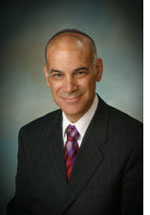By Rabbi Leonard Rosenthal

SAN DIEGO — One of the more noticeable differences between Reform and more traditional worship services is how the congregation says the first two lines of the Sh’ma. Most Reform congregations stand for the Sh’ma while more traditional congregations remain seated. Additionally, Reform congregations say the second line of the Sh’ma, Baruch Shem kavod malchuto l’olam va-ed, “Praised be God’s glorious sovereignty throughout all time,” out loud while traditional congregations say it silently.
The disagreement over one’s physical position during the recitation of the Sh’ma goes back to a dispute between the disciples of Hillel (Bet Hillel) and the disciples of Shamai (Bet Shamai). Bet Shamai said that one must stand for the morning Sh’ma, and either sit or recline for the evening Sh’ma. Bet Hillel said that the Sh’ma should be recited in whatever position one is in.
As usual, Bet Hillel won out. The halacha (Jewish law) is that one remains sitting for the Sh’ma since that is the position one is in when one arrives at its recitation. Reform rabbis, however, decided to have their congregations stand in deference to the importance and centrality of the prayer, which proclaims to the world that God is One.
The halacha is also that one recites Baruch Shem kavod (Praised be God’s sovereignty) silently because this verse is not found in the Torah. In fact, Baruch Shem kavod interrupts the Biblical text which flows smoothly from the Sh’ma to ve-ahavta: Hear, O Israel: Adonai is our God, Adonai alone. You shall love Adonai your God with all your heart, with all your soul, with all your might.” (Deut. 6:4-5)
Most likely Baruch Shem kavod began as a natural response to the words, “Hear O Israel,” almost as a kind of amen: “Yes, we agree that God is great, awesome, and holy. We are humbled by God’s goodness to us.” In order not to interject a non-Biblical verse between two Biblical verses, the rabbis decided it should be recited sotto voce*. The Reform movement, however, decided that our response to God’s greatness should be recited aloud.
Although the response of Baruch Shem kavod most likely evolved as a response to the greatness of the Sh’ma, the Talmud places these words into the mouth of Israel (Jacob) as he was about to die.
When he was on his deathbed, “Jacob called his sons and said, ‘Come together that I may tell you what is to befall you in the days to come.'” (Gen. 49:1) The text infers that Jacob was about to forecast the future of his clan. However, what follows in the Torah is not an oracle but rather a description of his sons’ personalities. Why did Jacob change his mind?
The Talmud says that Jacob did not change his mind, but was prevented from forecasting his sons’ future because God removed the gift of prophecy from him. When Jacob realized that he could no longer prophesize, he became upset and tried to think of what he had done to deserve this punishment. He first and foremost thought about his ancestors’ failings as parents, Abraham with Ishmael, and Isaac with Esau. He wondered whether he had also raised children who rejected God.
When he voiced his concern to his children, they answered him, “Hear, O Israel: Adonai is our God, Adonai alone. Just as you wholeheartedly believe in One God, so do we.” Hearing his children express their devotion and faith to God, Jacob responded in thanksgiving, “Praised be God’s glorious sovereignty throughout all time.”
When it came to fixing the prayer service, the rabbis had a problem. Should they include Jacob’s response to the Sh’ma in the liturgy, or exclude it because it was not found in the Torah Moses gave the Israelites? The decided to compromise: they included Baruch Shem kavod in the liturgy because of Jacob, but have us say it quietly in order to show deference to Moses. The managed to have their cake and eat it too!
The Conservative siddur (prayer book) was not written by one person expressing only one approach to prayer. Rather, it is an anthology encompassing many different authors and many different theologies. In this way, it reflects the way we should all approach our differences with others, through compromise and inclusion.
*
Rabbi Rosenthal is spiritual leader of Tifereth Israel Synagogue in San Diego. He may be contacted at leonard.rosenthal@sdjewishworld.com